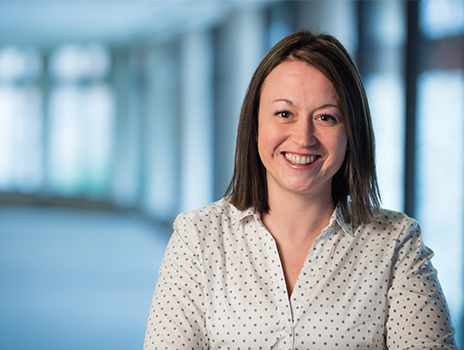A New Beginning for Former Epilepsy Patient


November 29, 2018
After suffering debilitating seizures for decades, Jessica Rostock – nursing student, wife and mother – underwent surgery at The University of Kansas Health System to remove part of the frontal lobe of her brain to eliminate epilepsy. Now 18 months after surgery, Jessica is seizure-free and living life to the fullest. Here, she reflects on her experience and new lifestyle, and offers encouragement for others seeking lasting treatment for epilepsy.
I am very happy with the surgery results. I am cured! I have no seizures.
Before I sought care at The University of Kansas Health System, I had been treated for epilepsy for 32 years. I was treated with a variety of medications with varied results. Exhausted and frustrated by the lack of lasting treatments, I looked to The University of Kansas Health System. I found Dr. Patrick Landazuri, and he was the best help I ever had. He and Dr. Paul Camarata together found a cortical dysplasia in my frontal lobe, a birth defect I had had for my entire life. Despite multiple MRIs in my lifetime, no one else had ever seen it. Once the team here discovered the cause of my epilepsy, they were able to remove it.
I feel so lucky and thankful to have found help here.

At The University of Kansas Health System, our ultimate goal is for epilepsy patients to live without seizures. To that end, we provide innovative technology for the treatment of epilepsy that can be found only at the best centers in the country and nowhere else in the region.
I take nursing classes. I do my homework. I work as a surgical technician in labor and delivery at Shawnee Mission Hospital. I volunteer in my son's kindergarten classroom. My family and I go to the park and the movies, and, in rare spare time, I like to read.
What I don't do is worry about whether I'll have a seizure at a dangerous or embarrassing or inconvenient time. It's such a freedom!
Living with epilepsy, I had a constant fear of a seizure coming on. What if I'm swimming in the pool and have a seizure? What if I'm speaking in front of a class and have a seizure? What if I'm in my son's classroom and have a seizure? What if I'm sitting in church and have a seizure? The fear was always there. It can be embarrassing and degrading to have to explain a seizure in a public place. And it was always frightening to think that I couldn't live my life like a normal person because of the constant threat of a seizure.
I have no seizures. I am never in fear of having one. And I am no longer constantly exhausted because of how draining the seizures could be.
I would tell them to take control of their care and find answers. Don't take any single option as concrete and final. If you're not happy with your care, get a 2nd opinion, and a 3rd opinion, and a 4th opinion if you need it. Also, please see a neurologist who specializes in epilepsy, an epileptologist. General neurologists are great doctors. I saw one for a long time. But epilepsy-focused neurologists are epilepsy experts. It only makes sense. They know more about the latest treatments and trends and are fully knowledgeable when it comes to options in epilepsy care.
I would also say to look seriously at surgery as a possible answer if you are a candidate. It can be a scary thought, but it could be a cure. Brain surgery was less scary to me than the thought of fighting seizures for the rest of my life. After a 3-month recovery, I returned to work, returned to school and returned to caring for my family. I could not have accomplished those things while having seizures. Yes, brain surgery is a big decision. But don't let it be fear that holds you back. Trust the experts.
Absolutely. The University of Kansas Health System's epilepsy care providers have an incredible passion for their work. It is impressive and inspiring to meet people with such drive. I had been on such a long and lonely journey, and these people showed me a positive light at the end of my tunnel. They made me feel like I was part of a team. I trust and respect them immensely.
What's more, I really hope to work with this team. I am about to graduate with my BSN, and I have been interviewing with The University of Kansas Health System. I am so thrilled! My goal is to work in neurosurgery one day. I have shadowed Dr. Camarata in the neuro OR, and I spoke with him at a neuroscience donor event. As a brain surgery patient, I felt safe and never scared. I felt that my team was invested in this journey with me. I was treated by educated, intelligent and innovative doctors who had my best interest in mind. I am so excited about the potential to become a part of that.
I know that the epilepsy care program and surgery schedule for epilepsy patients are growing, and I hope to use my experience and my voice to help these patients.
I feel no change cognitively and no difference in terms of intelligence. I have no dysfunction. I have no memory issues. I do have some emotional changes, and they come from the sense of achievement I gained in beating epilepsy. I have a bigger drive in life and bigger goals. I am more thankful for life.
We offer a variety of appointment types. Learn more or call 913-588-1227 to schedule now.